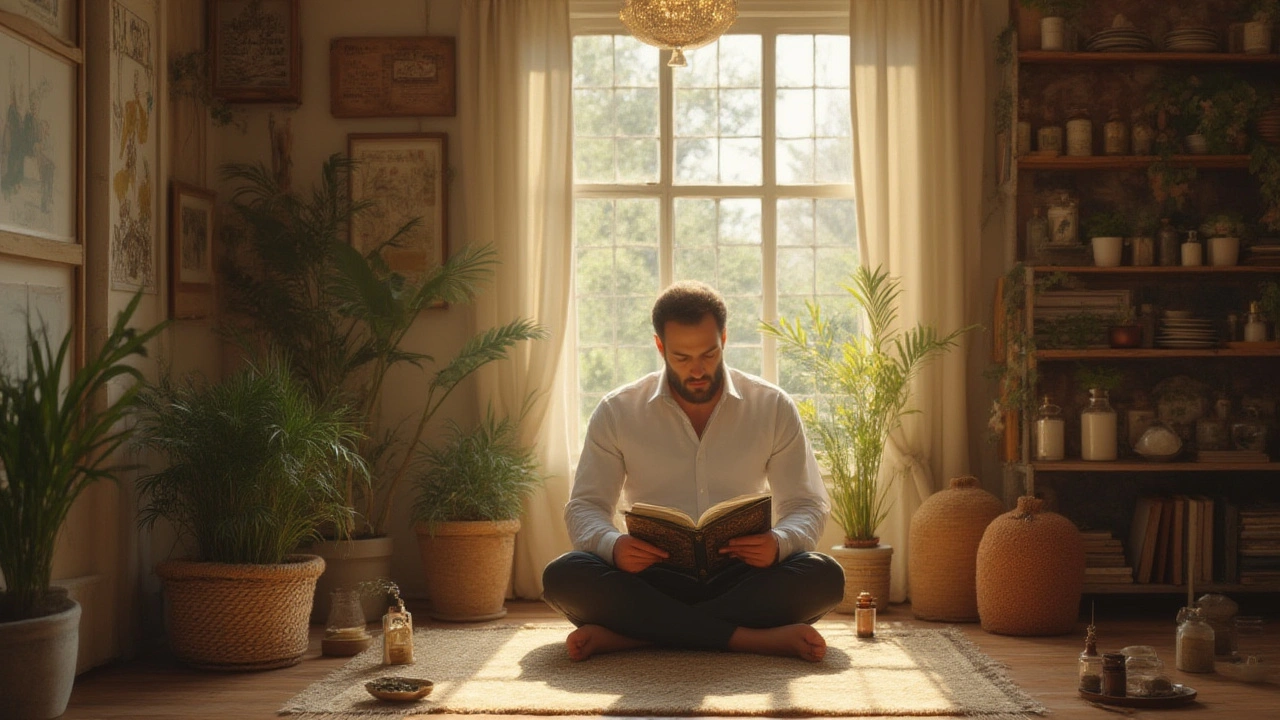Picture this: You wake up tired and your muscles already feel like you spent the night wrestling a bear. The day ahead looks brutally long. Sound familiar? Enter Abhyanga oil massage—a traditional Ayurvedic practice that turns your bathroom into a mini spa and upgrades your self-care game from meh to amazing. This isn’t just a luxury either. Ancient texts call Abhyanga a daily ritual for the healthiest, happiest life possible. Let’s see why people who swear by it consider it their not-so-secret weapon for melting stress, boosting mood, and even keeping their skin glowing.
The Roots and Science Behind Abhyanga Oil Massage
Abhyanga is much more than just slapping on some oil and giving yourself a quick once-over. In Ayurveda, it’s viewed as both medicine and meditation. The roots of Abhyanga go back 5,000 years, deep in the heart of India, where balancing mind, body, and spirit was seen as the only way to truly heal. The basic idea? You use warmed herbal oils, chosen specifically for your body type—known as your dosha—to deeply nourish tissues, draw out toxins, and calm both the body and mind. There’s a practicality backed by ancient wisdom here. For example, sesame oil, packed with vitamin E and minerals, is a favorite because it penetrates the skin so well, while coconut oil cools and soothes overheating or irritation.
Modern science agrees with a lot of this hands-on wisdom too. Several clinical studies, including one conducted by the Department of Physiology at SVYASA University in Bangalore in 2019, found that regular Abhyanga dramatically lowers stress markers (like cortisol), improves skin barrier strength, and even helps regulate immune response. There’s also data showing significant improvements in sleep and reduction in symptoms of anxiety. Substitute your average body lotion with an ayurvedic oil blend and you’re not just fighting dryness. You’re feeding your nervous system too.
Here’s a compelling fact: Traditional Abhyanga is usually done in the morning to stimulate lymphatic drainage and energize your day, but it’s just as valuable at night to help you unwind. In fact, a 2021 user survey published in India’s Journal of Ayurveda and Integrative Medicine reported that people who practiced Abhyanga at least three times a week experienced fewer aches, less insomnia, and improved mood compared to those skipping this ritual.
| Abhyanga Oil | Main Properties | Suitable Dosha |
|---|---|---|
| Sesame | Warming, nourishing | Vata |
| Coconut | Cooling, soothing | Pitta |
| Mustard | Stimulating, detoxifying | Kapha |
The oils aren’t chosen at random. An Ayurvedic specialist might suggest sesame oil if you’re cold, achy, or feeling scattered (classic Vata issues), and stick with coconut oil if you’re running hot or irritable often (classic Pitta profile). So, Abhyanga is not only sensory delight but also customized care. What’s wild is how this tailored approach works for modern 24/7 lifestyles where everyone feels out of balance sometimes.
The Ritual: How to Practice Abhyanga at Home
Getting started with Abhyanga oil massage isn’t intimidating—promise. You don’t need a fancy spa room or expensive tools. Here’s what you do need: a clean towel, some old clothes (the oil gets everywhere, trust me!), your chosen oil, and about 15–20 minutes. You’ll want the oil warm, never hot. Use a simple double boiler or a heat-safe container in just-hot water. Before starting, it helps to spend a minute focusing on your breath—set your phone on do-not-disturb mode so you won’t get sidetracked by that 9 am calendar alert.
Apply the oil to your scalp first if you’re not rushing out after (it does make your hair greasy, but that’s the tradition). Next, move to your ears, neck, shoulders, and arms. Long strokes for the limbs, gentle circles around joints—that pattern aids lymphatic flow. Always massage toward the direction of your heart. For your chest and stomach, use broad clockwise circles. Lower back and hips? Give them extra love with slow pressure. Don’t skip your feet; Ayurvedic texts say massaging feet alone helps restore your entire body, thanks to all the nerve endings there.
Here’s a pro tip: Spend at least two to five minutes on each area. If you feel tension, pause there and add a little pressure or extra oil. Some practitioners even use warm towels afterward to help the oil soak in, but a hot shower works too. You’ll feel slippery at first, but wait 10–15 minutes before washing off the excess oil. This pause helps your skin and nerves soak up the full benefits. Avoid using harsh soaps; just rinse well with warm water. If you’re prone to oily skin, opt for lighter oils like sunflower or grapeseed instead.
- Warm your oil for better absorption and comfort.
- Massage with slow, mindful strokes—rush and you lose the relaxing effect.
- Avoid doing Abhyanga immediately after meals.
- Make it a daily morning ritual if you’re looking for energy, or try it at night if you crave calm.
- Clean your bathroom floor afterward because the oils can be slippery (speaking from embarrassing experience!).
A lot of people enjoy a blend of oils with a few drops of calming essential oils like lavender or sandalwood. Just test your blend on a small patch of skin to avoid irritation. And yes, unscented oils work fine if you’re sensitive to strong smells. The best ritual is the one you actually stick with.

Why Abhyanga Is More Than Just a Massage
This daily ritual isn’t just about feeling good (though, let’s be real, that part is amazing). There’s a much bigger picture here. Massaging the body every day is believed in Ayurveda to extend life, boost the immune system, and even slow down aging. The research is catching up. For instance, a 2022 study published in ‘Evidence-Based Complementary and Alternative Medicine’ found that regular self-massage improved biomarkers related to inflammation, especially among people under intense stress.
Let’s talk real-life results: People practicing Abhyanga weekly often report glowing skin, less stiffness, and fewer headaches. Those taking things up a notch and doing it daily? Many see deeper sleep and more stable moods within weeks. There’s something satisfying about building a relationship with your body, not just racing to fix what’s wrong. It connects you with ancient tradition, with mindfulness, and, on some days, even with a sense of confidence you can’t get from a green smoothie.
Another irresistible bonus: Abhyanga does wonders for dry, flaky skin—the kind that no body butter can touch. Sesame oil in particular contains natural antioxidants, which fight off free radicals (those annoying molecules that speed up skin aging). The repetitive strokes of massage boost circulation, making nutrients reach every cell just a little bit better. Ever seen someone with that just-got-back-from-vacation glow? Their secret might just be Abhyanga, not an overseas flight. Even sore sports injuries or “phone neck” tend to recover faster with gentle oil massage, since the practice reduces micro-inflammation and releases muscle tension.
Are you someone who can’t sit still for standard meditation? Abhyanga is a practical workaround. Focusing on your body, oil, and the sensation of your hands keeps your brain from wandering through endless to-do lists. Ten minutes every day alters your stress response—lowering blood pressure, calming anxious feelings, and even reducing chronic fatigue symptoms, as confirmed by a 2018 trial at the University of Kerala.
And let’s shatter the myth that self-massage is only for women, or only for times of illness. In India, whole families—from toddlers to grandparents—get regular Abhyanga. Sports figures, high-stress professionals, and even students use it to sharpen focus and keep their energy level steady. Even a rhythm of twice a week can make a difference if you’re pressed for time.
Customizing Oils and Techniques for Your Body and Mind
The real magic of Abhyanga is how flexible it is. You can personalize your oil, your schedule, and even which parts of the body get attention based on what you need most that day. The classic Ayurvedic approach recommends matching your oil to your dosha. If your joints ache in cold weather, sesame or almond oil is your best friend. If your skin flushes red at every little annoyance, cooling coconut oil calms irritation. If you’re all about fighting sluggishness—those days when everything feels foggy—mustard oil has a gentle heat that wakes up your system. Add a few drops of calming or energizing essential oil, and you’ve made an aromatherapy mashup that’s totally yours.
But you don’t have to get a dosha analysis before trying this. Listen to your body. If the oil feels too heavy and greasy, switch to a lighter option. Sunflower oil is great for summer, grapeseed in humid weather, and even olive oil can work if your skin tolerates it. During pregnancy or certain health conditions, opt for safe, tested blends (speak with your doctor first if you’re unsure).
Got just five minutes? Do a targeted Abhyanga for your neck and shoulders after a long Zoom meeting. Battling insomnia? Focus extra attention on your feet before bed; many people find this alone can help lull them to better sleep. Looking for radiance before a big meeting or event? Massage face and décolleté with a gentle rose or apricot kernel oil before your shower, then let the steam help it soak in. The Abhyanga routine can flex and bend with whatever kind of day you’re having.
Don’t forget to treat Abhyanga as a moment for yourself, not another chore. While it’s a healing physical practice, it’s also a rare time when you can tune in—feel where you hold stress, reconnect with your breath, or even use a mantra or favorite playlist. Many modern coaches now recommend integrating Abhyanga with mindfulness or gratitude techniques: As you massage, focus on one thing you’re grateful for that day. Suddenly, your morning routine isn’t just practical, it’s a little bit magical.
Here’s what’s probably most surprising: This isn’t just about beauty or even health. People who stick with Abhyanga, even just a few times a week, talk about feeling anchored, less frazzled, and even more optimistic. If you’re looking for a home ritual that delivers on glow, strength, and emotional balance—with roots in wisdom older than most empires—Abhyanga oil massage is definitely worth claiming as your own.


 Health and Wellness
Health and Wellness